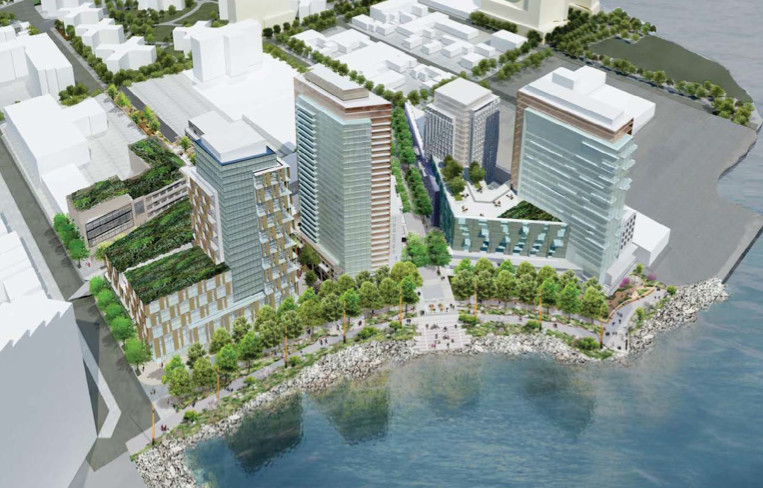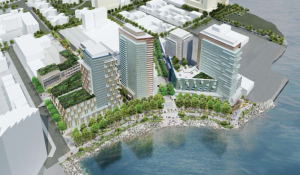City Planning Commission Approves Astoria Cove
By Tobias Salinger September 29, 2014 5:28 pm
reprints

The City Planning Commission voted to recommend approval today for the proposed 1,723-unit Astoria Cove mixed-use development slated for an 8.7-acre site overlooking Pot Cove on the Queens waterfront.
A development team called 2030 Astoria Developers that includes Long Island City-based Alma Realty gained a positive vote after an earlier thumbs down by Community Board 1 and Queens Borough President Melinda Katz. The vote, with 10 commissioners signing on, one granting partial approval and two abstaining reflects commissioners’ support for a new direction for rezonings under Mayor Bill de Blasio‘s Administration, said Carl Weisbrod, the chairman of the commission.
“This development will be the first to be subject to a mandatory inclusionary housing requirement set forth in the zoning resolution,” Mr. Weisbrod said, calling the proposal a “harbinger” of future rezonings. “The Astoria Cove development would add a mix of market-rate and affordable housing, employment, shopping and recreational opportunities to service the needs of current and future residents in this portion of the growing neighborhood of Astoria.”
The proposed 2.2-million-square-foot development, which now moves to the City Council under the Uniform Land Use Review Procedure, includes 345 affordable units, a 25,000-square-foot grocery store, a site for a 456-seat school and 1.92 acres of new publicly accessible open space. The proposed rezoning “heralds the dawn of a new era in equitable development in New York City” and opens a waterfront that’s currently blocked-off by industrial properties, the developers said.
“Astoria Cove will bring significant investment, good-paying jobs, hundreds of units of affordable housing, local stores and shops, and an expansive open space network to a community that has been neglected for too long,” said 2030 Astoria Developers in a prepared statement following the vote. “Astoria Cove also will be one of the most environmentally friendly and sustainable projects in the city’s history. All of this will be accomplished without any public subsidy.”
But at least two of the commissioners expressed reservations with the affordability component of the development, which stands at 20 percent of its total residential units in Astoria Cove’s five planned high-rises. Both the borough president and the community board called for more affordable units at the site and a coalition of more than 50 housing advocacy groups called the Real Affordability for All coalition will continue pressing for 50 percent affordable units at this site and low-income requirements for them as the City Council considers the rezoning, said Jaron Benjamin, the executive director of the Metropolitan Council on Housing.
“Where we’re going to focus our efforts now is working with community members and the City Council,” said Mr. Benjamin, drawing a parallel between the current affordability requirement and the previous administration’s incentive system. “People have to understand that we can do better than 20 percent. We got that under Bloomberg, and we can do better than that.”
While the development team has yet to meet with the coalition, changes to the proposal in past months–such as increasing the overall number of affordable units from 295 and locating them throughout the site–reflect the developers’ willingness to engage stakeholders with the coalition’s perspective and make adjustments, said 2030 Astoria Developers’ representative, Howard Weiss of Davidoff Hutcher & Citron.
“The project that you see today is the result of that dialogue,” Mr. Weiss said.
Local Council Member Costa Constantinides, a Democrat who represents Astoria and parts of Woodside, East Elmhurst and Jackson Heights, called the vote “only the start of this process” in a statement.
“While the new housing stock is sorely needed, the development must work for all Astorians,” said Mr. Constantinides, whose position on the rezoning proposal will, in all likelihood, determine how his colleagues vote. “When the project comes before the City Council, we will work with the developer and focus on providing ample affordable housing, dramatically increasing public transportation capacity on and off of the peninsula, and keeping the development within the fabric of the community. The development, done correctly, has the opportunity to be a transformative moment for us but only if built to the highest standards.”
Update: This article was updated to include a quote from Council Member Costa Constantinides.



